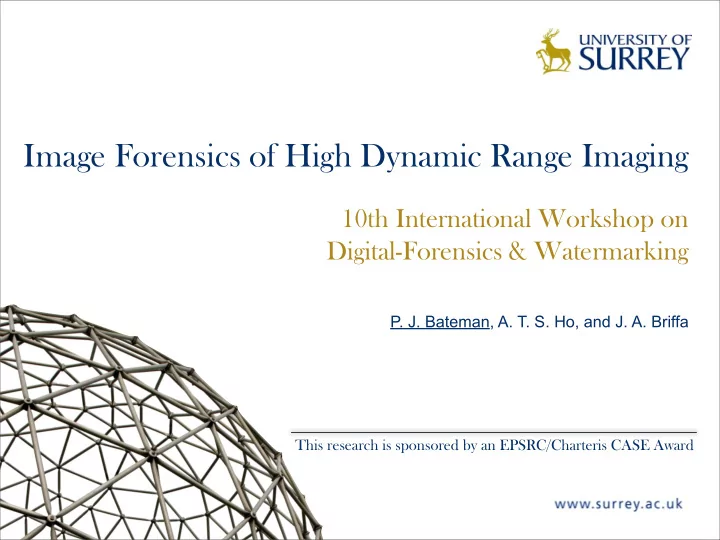

Image Forensics of High Dynamic Range Imaging 10th International Workshop on Digital-Forensics & Watermarking P. J. Bateman, A. T. S. Ho, and J. A. Briffa This research is sponsored by an EPSRC/Charteris CASE Award
Image Forensics Uncovering facts about an image without actively injecting data Verify the integrity of a digital image Source Classification Forgery Detection Camera Identification Processing History Recovery Anomaly Investigation M. Chen, J. Fridrich, M. Goljan, and J. Lukás, “Image Origin and Integrity Using Sensor Noise,” IEEE Transactions on Information Security and Forensics , 3(1), pp. 74-90, March 2008 H. Farid, “Digital Image Forensics”, American Academy of Forensic Sciences , Washington, DC, 2008
HDR Pipeline Camera Merging and Registration Auto-bracketing LDR version of HDR Image Tone Mapping
HDR Imaging HDR -1EV 0EV +1EV E. Reinhard, G. Ward, S. Pattanaik, and P. Debevec, “High Dynamic Range Imaging: Acquisition, Display, and Image-Based Lighting,” Morgan Kauffman , ISBN: 978-0-12-585263-0, 2005.
High Dynamic Range Imaging
High Dynamic Range Imaging
High Dynamic Range Imaging
High Dynamic Range Imaging
High Dynamic Range Imaging Image Histogram 700,000 LDR 350,000 0 0 255 60,000 HDR 30,000 0 0 255
HDR is Popular
iPhone 4 Camera Useage Stats taken from Flickr.com (24-October-2011)
Can we detect HDR- Processed Images?
Research Motivation • An increasingly popular photography method • On-board implementations • More and more HDR images will exist amongst LDR • EXIF metadata shows little regarding HDR processed images. • The HDR pipeline differs from manufacturer to manufacturer • Do images contain fingerprints of specific manufacturing pipelines? • Images can look heavily processed, but are straight off camera • This may fool existing Forensic algorithms • A novel subject of Image Forensics
HDR Detection in Image Forensics Camera Identification Processing History Anomaly Investigation Recovery
HDR Pipeline Camera Merging and Registration Auto-bracketing LDR version of HDR Image Tone Mapping
Homomorphic Filtering • Operates on Illuminance-Reflectance model • illuminance can be reduced • Separate illuminance and reflectance components I(x,y) = i(x,y) · r(x,y) D = log i(x,y) + log r(x,y) • (High-Pass) filtering in FFT domain is applied* • Attenuate low frequencies (illuminance) • Preserve high frequencies (reflectance) *A. V. Oppenheim, R. Schafer, and T. Stockham, “Nonlinear Filtering of Multiplied and Convolved Signals,” in Proceedings of the IEEE, 56(8), pp. 12641291, 1968.
The Problem with HF “Strong” edges contain high and low frequency data Haloing artefacts are produced G. Qiu, J. Guan, J. Duan, M. Chen, “Tone Mapping for HDR Image using Optimization: A New Closed Form Solution,” 18th International Conference on Pattern Recognition, pp. 996-999, 2006.
The Experiment Aim: To accurately classify HDR/LDR images Device Used: Apple iPhone 4 (Native Camera App) Method: Capture 100 real-world “landscape” images • 50 HDR • 50 LDR Images are captured from a tripod to ensure registration processing is minimised
HDR Image
LDR Image
Spatial Pixel Distribution LDR HDR
The Strategy Remove Read Image Texture (extract luminance) Find Majority Classify FFT Canny Edge “Strongest” Voting Edge Data Edge Data Edge Output
1. Read Image and Extract Luminance
2. Canny Edge Detection
3. Threshold Y to B&W
4. Morphology: “Open”
5. Sobel Edge Detection
6. Morphology: “Open”
7. Remove Weaker Edges Remove connected edges that do not satisfy: angle > ±10 of 90°
7. Remove Weaker Edges Remove connected edges that do not satisfy: angle > ±10 of 90°
8. Plot Pixel Distribution
9. Convert to FFT Domain
10. SVM: Train and Classify 2 classes: LDR / HDR Training Test 90 10 No. of images (45HDR; 45LDR) (5HDR; 5LDR) Edge vectors (per image) 100 100 Total no. of feature vectors 9,000 1,000 Essentially classifying each edge independently
Results • Each classification from test set is mapped back to its respective image set (100 per image) • Majority voting of the results to yield overall image classification
Results Test Image Actual Predicted Confidence • Each classification from test set is mapped back to 1 LDR LDR 87 its respective image set (100 per image) 2 LDR LDR 92 3 LDR LDR 100 4 LDR LDR 91 • Majority voting of the results to yield overall 5 LDR LDR 90 image classification 6 HDR HDR 88 7 HDR HDR 99 8 HDR HDR 80 9 HDR HDR 69 10 HDR HDR 55
Summary • A proof-of-concept has been presented for detecting HDR processed images • Halo artefact present in iPhone 4 HDR edges • Large peak in intensity values characterised at strong edge points • Strategy for detecting strong edges identified • Scheme tested and trained on 100 images • Classification accuracy of 100% (after majority voting)
Future Work • Strengthen strategy for detecting strong edges • Consider edges of all possible orientations • Greatly increase image set size • Extend to classify from more device sources • Classify HDR Apps that created the image
Questions?
Recommend
More recommend